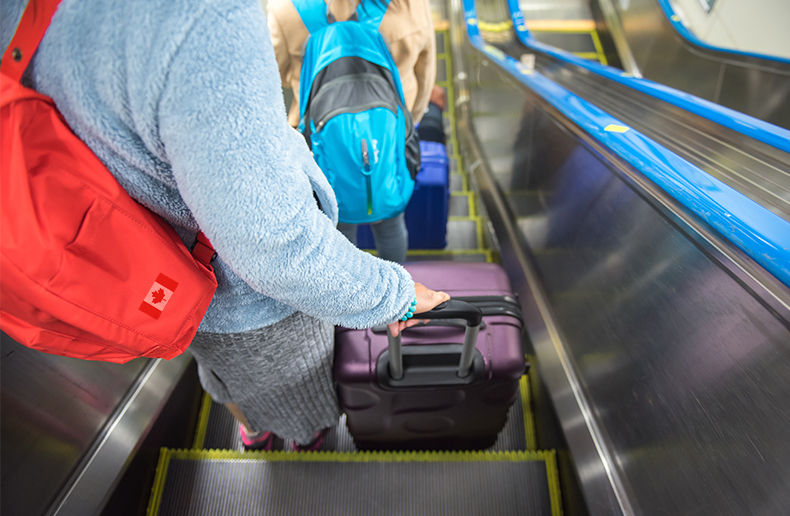Five Medavie Blue Cross clients successfully maintained their group insurance plan despite losing income due to the pandemic. How did they do it?
The firms unveiled their winning management practices at a webinar that the insurer organized and the Insurance Portal attended.
The clients’ advice: Think about things differently. Learn from the crisis. Most importantly, focus on your employees and their well-being to protect your business.
Air Transat
“Our employees are our most valuable resource,” Christophe Hennebelle, Vice-President, Human Resources and Public Affairs of Air Transat says unhesitatingly. The industry sector in which the airline operates has been hard hit by the pandemic: more than 2,000 workers were laid off. The number of flight attendants spiralled from 355 before the crisis to less than 160 in September.
However, almost 80% of employees preferred to stay on the Canada Emergency Wage Subsidy (CEWS) rather than apply for employment insurance. The main reason for this was that the CEWS let them maintain a symbolic link with the company.
Transat also made a point of preserving group insurance programs for laid-off employees, especially medical and dental care coverage. It also kept the disability program running, particularly for pilots. “There is a cost to maintaining these programs, but it is extremely important for us to be able to offer them,” Hennebelle explains.
The aviation sector anticipates a long, slow climb back to normal. Travel will eventually resume. Whether it be to go on vacation or visit family, it's important for people. The recovery for this type of travel will be quite quick,” he says.
Business travel is a bigger challenge, Hennebelle continues. “It will certainly be the type of travel that will be the most impacted by the pandemic and will have the slowest recovery and even permanent consequences.”
Supporting employees remotely
The Alliance québécoise des techniciens et techniciennes de l'image et du son (AQTIS - Alliance of Image and Sound Technicians) also considered it essential to keep group insurance plans going, despite job losses, at least until the end of the year.
“We wanted all workers to at least have access to services and assistance programs, such as mental health services or the family economics cooperative association, where financial advisors can help families restructure their budgets. We didn't want them to have to cash in their entire RRSPs just to keep their heads above water,” says AQTIS General Manager Gilles Charland.
Nathalie Tessier, Human Resources Director for the AFFI Logistics Group, a company specializing in logistics outsourcing, says the company contacted its employees about every two weeks. It only wanted to keep in touch with employees, but also to share the measures taken to secure the company.
“It has allowed us to keep in touch, strengthen our ties with our teams, but also to see many employees return to work. We have maintained trust,” she points out.
Teleworking has proven that it is important for employers to be more present for employees,” Medavie CEO Bernard Lord explains. “We must offer our employees services, but more importantly take the time to listen to them. We have put in place a consultation process that lets us to adapt to their needs and offer them customized programs,” he says.
Dispelling reluctance to telework
Sylvie Voyer, Vice-President, Human Resources and Communications at Air Liquide Canada, a company specializing in gas, equipment and services for industry and healthcare, explains that before the pandemic, telework was scoffed at. “It was commonly believed that people who teleworked wouldn't actually work. The pandemic forced us all to adopt this work mode. Telework has proven its worth,” she says.
Although it has many advantages, telework also has constraints, especially on the social level. Most employers on the panel mentioned that they have added telemedicine options to their group program.
“Our workers’ health is important. Offering these kinds of options to ensure the mental health of our employees and communicating with them regularly has created a very strong sense of belonging among our members,” explains Nathalie Tessier of the AFFI Group.
The pandemic has exposed the gaps in our companies,” Bernard Lord says, “but it has also been a learning experience. Air Transat's Christophe Hennebelle would not describe the response as a reinvention. “We're accelerating a number of things and maybe abandoning others that were no longer necessary,” he says.
Some of Medavie Blue Cross’s employer clients add that the pandemic has spurred collaboration with their competitors and spawned new partnerships to optimize the recovery. The pandemic has led other firms to advance more quickly and launch new projects, such as an operational transactional site.
Groupe Lou-Tec is one example. “We have accelerated the launch of our interactive platform, which allows us to reach every worker in our company. This platform allows us to dialogue with employees, not only to transmit information, but also to solicit their questions, concerns and suggestions,” explains Nancy O'Hearn, Vice President, Culture and Communications at the Group.
Lou-Tec planned to launch this platform some time last year, but the pandemic hastened its deployment. O'Hearn adds that the health crisis has taught the management team to be more transparent in its communications with employees, who also have concerns. “The pandemic has forced us to go back to basics and showed us that we had the right values in place and a management and communication style with our employees that made us agile. As a result, we know we can be successful and build a solid future for the company.”







